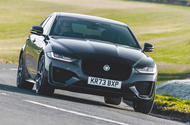Could Jaguar’s transition into an all-electric brand force one of its less commercially successful models into retirement too early?
It’s now a decade since British sports car and saloon specialist Jaguar chose a motor show stand in Geneva, Switzerland, to tell the world that it was finally taking on one its toughest assignments in modern times: going after the BMW 3-Series. This time, unlike with the Ford Mondeo-based X-Type, it would do that with a proper, rear-driven saloon worth its salt. Later in 2014, the extensively aluminium-constructed Jaguar XE met the world’s motoring press in Paris, and production at Castle Bromwich began the following year. And now – after for so long trying to compete with arguably the most dominant and successful executive saloon in the world, and lately setting its sights a little lower – the XE is staring retirement in the face. By 2025, we are told, Jaguar’s modern reinvention as an all-electric brand will be off and running – and every one of its old combustion-engined models, this one included, will have been taken off sale. So now in its twilight years – and itself like some tribute to a time when Jaguar still harboured ambitions to strike out amongst Europe’s big-selling premium brands, rather than transforming itself into a zero-emissions luxury player as it seems now intent on doing – what does the XE have to offer today’s executive saloon buyer? And it might it be worth one final fling in a British-built, combustion-engined saloon, before the lights finally go out of Jaguar saloons as we have known them?







